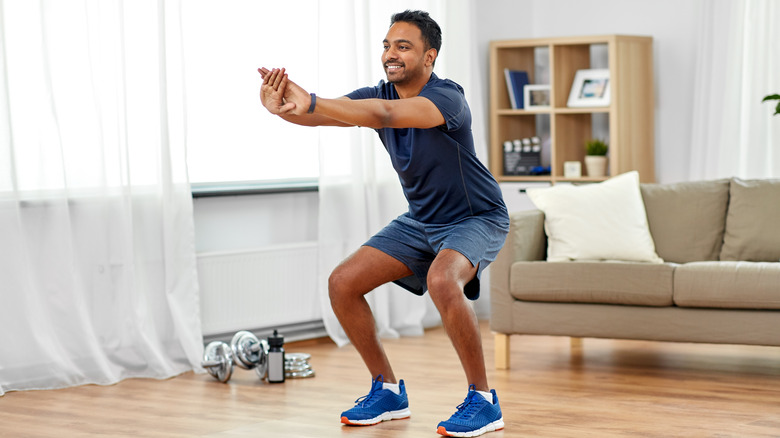Breaking Up Long Bouts Of Sitting With Activity 'Snacks' Can Help Maintain Muscle Mass, Study Finds
Prolonged periods of inactivity can negatively impact your physical and mental health while increasing your risk of death from multiple causes. More than 50% of Americans spend over six hours sitting each day, and Healthline says this seemingly harmless habit can have short- and long-term effects. From side effects like weight gain to depression, anxiety, a heightened risk of cancer, heart disease, diabetes, muscle loss, and spinal degradation, a sedentary lifestyle is anything but benign.
However, you don't have to spend hours at the gym or trade your desk job to combat the effects of sitting all day long. The Mayo Clinic says introducing regular, short periods of movement into your daily routine could profoundly impact overall well-being. Now, a new study published in the Journal of Applied Physiology suggests that breaking up long bouts of sitting with activity "snacks" can help maintain muscle mass and quality. Activity snacks are short periods of walking, body weight exercises, or other moderate activity (per ScienceDaily). Adding these activities into your daily work routine or TV time could help protect your health.
Short bursts of activity could help maintain your health
In the 2022 study, published in the Journal of Applied Physiology, researchers at the University of Toronto found that just two minutes of walking or doing squats could help the body process sugar from meals more effectively. The study followed 12 participants for 7.5 hours of prolonged sitting. Participants were interrupted from sitting every 30 minutes to walk around or perform body-weight squats. The short periods of activity helped the body use amino acids from food more efficiently, which could help with muscle repair.
According to Healthline, sitting for long periods can weaken muscles in the legs and glutes. Breaking up sedentary periods with regular, short bursts of activity can protect against loss of muscle mass and help the body use dietary proteins to repair muscle proteins.
"Our results highlight the importance of breaking up prolonged sedentary periods with brief activity snacks," Daniel Moore, lead study author and associate professor of muscle physiology at the Faculty of Kinesiology & Physical Education, told ScienceDaily. "We believe they also highlight that moving after we eat can make our nutrition better and could allow more dietary amino acids from smaller meals or lower quality types of protein to be used more efficiently."


